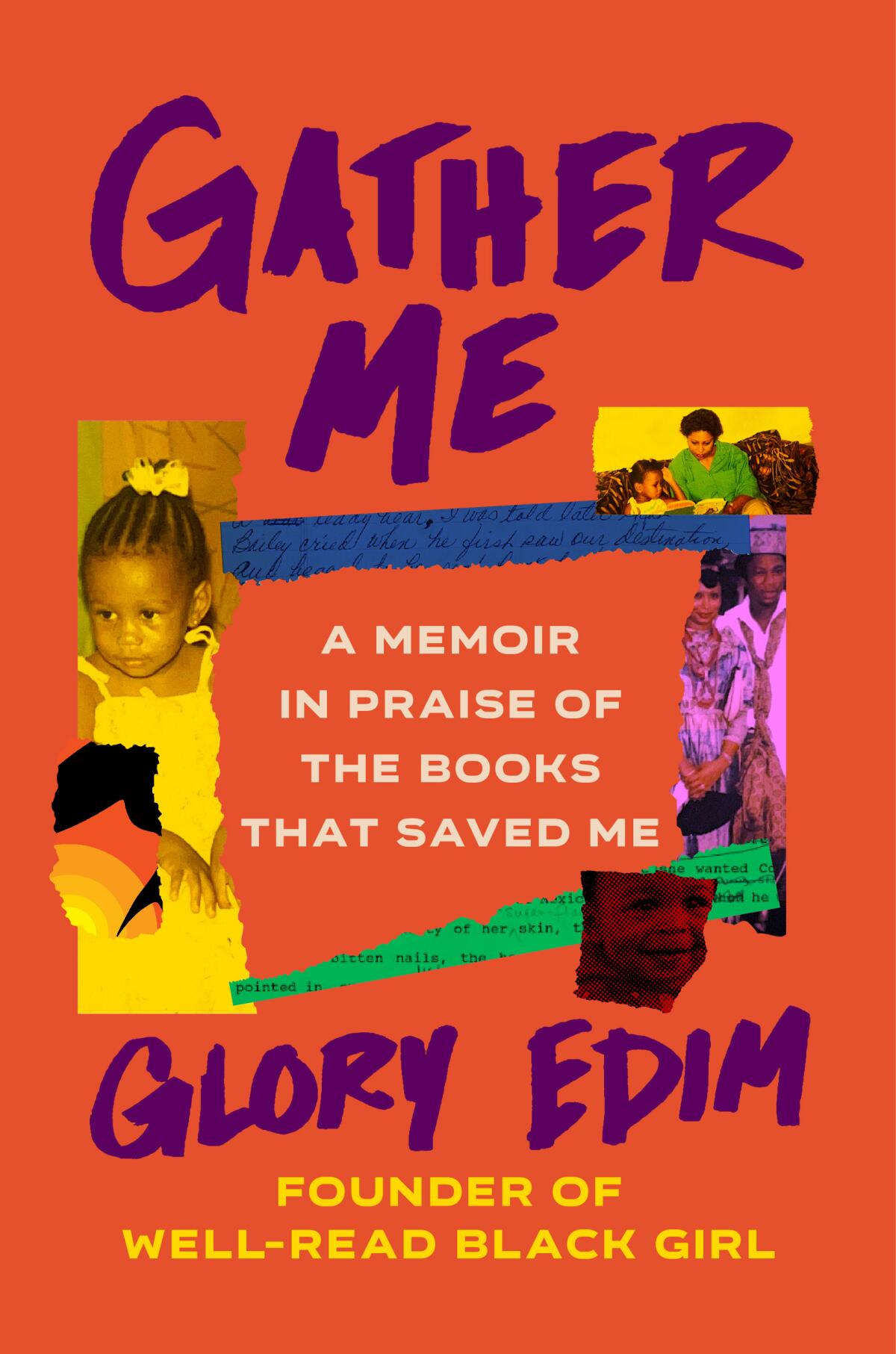Book Review
Gather Me: A Memoir in Praise of the Books That Saved Me
By Glory Edim
Ballantine Books: 288 pages, $28
If you buy books linked on our site, The Times may earn a commission from Bookshop.org, whose fees support independent bookstores.
No one is a better candidate for a biblio-memoir than Glory Edim, the creator of Well-Read Black Girl, a book club with close to half a million Instagram followers. Fans of her club, which foregrounds Black female writers, will likely want to read about the authors who shaped this self-made literary titan. But “Gather Me: A Memoir in Praise of the Books That Saved Me” delivers much more: a dramatic life story full of hairpin turns and interwoven leitmotifs that might seem ingeniously crafted if it weren’t all true.
Edim grew up in Arlington, Va., the daughter of an architect and a teacher, both Nigerian immigrants. Her mother read to her as a baby, and Edim read to her younger brother, Maurice, after her parents divorced when she was 8, her father disappeared mysteriously and her mother took two jobs to support the family. Together they savored “Corduroy,” “Charlie and the Chocolate Factory” and “Charlotte’s Web,” and they vanished into the stacks of the Arlington Public Library, quietly calling out “brother” and “sister” to find each other when it was time to leave.
After her mother’s remarriage and the arrival of another sibling, Edim became a virtual preteen parent, changing diapers, picking up her brothers from day care and school, feeding them and putting them to bed. But her experience wasn’t shared by anyone she knew — or reflected in the many books she read.
And her life got harder and harder. Her emotionally corrosive stepfather hammered away at her self-esteem, telling Edim she was doomed to be “knocked up by 15” even though, she writes, “I was a churchgoing teenager whose biggest rebellion consisted of trying to steal a little extra time to read.”
When Edim, then 11, saw footage of Maya Angelou reading at Bill Clinton’s 1993 inauguration, it was a revelation.
“Imagine being a pubescent child suffering under the eye of a stepfather who made it his personal quest to make sure I was thoroughly ashamed of my own body and its nascent sexuality,” she writes. “And then imagine … the shock and thrill” of reading Angelou, “who led me back to the person I had once been.” She memorized poems such as “Still I Rise” as if she were “taking notes on my impending womanhood.” Through Angelou, she found Nikki Giovanni, James Baldwin, Ntozake Shange and Toni Morrison.
Edim encountered the poet again in high school, when her beloved, white Advanced Placement English teacher (she had no Black teachers) assigned “Catcher in the Rye,” which she detested, as if it were a “sacred offering” and accused Angelou, her favorite writer, of bad grammar. But the teacher listened patiently as she explained why this was a misreading of Angelou’s vernacular style, even helping her formulate her argument against him. He thereby helped cultivate the critical thinking that made Edim see the curriculum’s broader flaws — even if he didn’t. “I sometimes find myself still arguing with Mr. Burns in my head,” she writes.
As a teenager, Edim effectively became a single parent not only to her brothers but also to her mother, whose divorce from her second husband sent her into a debilitating depression. A “shuffling zombie,” her mother largely stopped getting up, going out and, most significantly, talking — for five years. Edim had no adults to turn to; the one family friend she approached pronounced her mother “possessed.”
A snapshot of Edim’s life as an undergraduate at Howard University during this time should make any professor think twice about judging students who nod off in class. She was up at 5 a.m. to wash and feed her mother and confer with Maurice about who would pick up their younger brother from school and shop for food. Then, she writes, “I had my own classes to attend, a tutoring session to run, the daily challenge of pretending to be an average, happy, functional senior in college, not a desperate, exhausted caretaker, sister and daughter who could barely keep the lights on.”

Glory Edim
(Tamera Darden)
She also worried about her brothers’ safety in the wake of the Rodney King beating and other incidents of police brutality. Baldwin’s “The Fire Next Time” gave her “the vocabulary to describe that helpless impulse to try to protect the people you love from a system that you can’t control.”
As Edim struggled to make sense of both the mother she had and the mother she had lost, she read Audre Lorde’s “Sister Outsider,” and a switch flipped. “My own mother taught me to survive from a very early age by her own example,” Lorde writes. “Her silences also taught me isolation, fury, mistrust, self-rejection, and sadness.” Survival, the writer adds, is the greatest gift, and “sometimes, for Black mothers, it is the only gift possible.”
With Lorde’s help, Edim came to grips with the fact that she was now truly motherless — coincidentally, while she was on a plane to Nigeria to reconnect with her father and become, after more than a decade of separation, “somebody’s child once more.” Ultimately, both her parents returned to her life through a nearly miraculous series of events best enjoyed without spoilers.

Edim’s first book, “Well-Read Black Girl: Finding Our Stories, Discovering Ourselves,” is an anthology of writing by Black authors answering the question “When did you first see yourself in literature?” “Gather Me” is her own answer.
You could read it for its spectacular narrative arc alone, but don’t. Read it to see how libraries can be a crucial refuge for children whose home lives are unmanageable. Read it to see how white-dominated high school curricula can erase and invalidate Black students. Read it because so many of the books that nurtured, guided and empowered Edim are the ones MAGA Republicans want banned.
And read it because, as Baldwin once said, “You think your pain and your heartbreak are unprecedented in the history of the world, but then you read.”
Margot Mifflin is a professor at the City University of New York and the author, most recently, of “Looking for Miss America: A Pageant’s 100-year Quest to Define Womanhood.”

